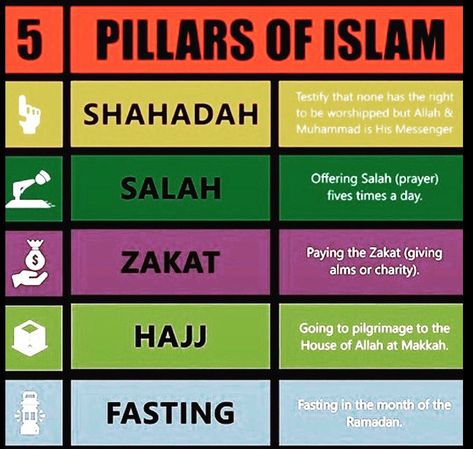Five Pillars of Islam
The ‘Five Pillars’ of Islam are the foundation of Muslim life. Carrying out these obligations provides the framework of a Muslim’s life, and weaves their everyday activities and their beliefs into a single cloth of religious devotion. No matter how sincerely a person may believe, Islam regards it as pointless to live life without putting that faith into action and practice. Carrying out the Five Pillars demonstrates that the Muslim is putting their faith first, and not just trying to fit it in around their secular lives.

1) Shahada
This is the basic proclamation of the Islamic faith. In Arabic it is pronounced “Ashhadu Alla Ilaha Illa Allah Wa Ashhadu Anna Muhammad Rasulu Allah” – (There is no God but Allah, and Muhammad (saw) is his messenger)
2) Salah or prayer
Salah or salat is the 5 time obligatory prayer performed 5 times per day. The prayers are performed at set times and are obligatory for all above the age of puberty.
These prayers are:
1. Salat al-fajr: dawn, before sunrise
2. Salat al-zuhr: midday, after the sun passes its highest
3. Salat al-‘asr: the late part of the afternoon
4. Salat al-maghrib: just after sunset
5. Salat al-‘isha: between sunset and midnight
The set prayers are not just phrases to be spoken. Prayer involves uniting mind, soul, and body in worship. Make sure that you are in the right frame of mind before you pray; put aside all everyday cares and thoughts so that you can concentrate exclusively on God.
•Muslims do not pray for the benefit of Allah.
•Allah does not need human prayers because He has no needs at all.
•Muslims pray because God has told them that they are to do this, and great benefit is gained in doing so – Muslims pray direct to God
•A Muslim prays as if standing in the presence of Allah.
•In the ritual prayers each individual Muslim is in direct contact with Allah. There is no need of a priest as an intermediary. (While there is a prayer leader in the mosque – the imam – they are not a priest, simply a person who knows a great deal about Islam.)
•Muslims can pray anywhere, but it is especially good to pray with others in a mosque.
•Praying together in a congregation helps Muslims to realise that all humanity is one, and all are equal in the sight of Allah.
•Muslims must be clean before they pray. They make sure of this by performing ritual washing, called wudhu.
Call to prayer
•Each congregational prayer is preceded by an azaan which is a call to prayer. The azaan translates:
•allahu akbar allahu akbar – God is great God is great
•allahu akbar allahu akbar – God is great God is great
•ash-hadu alla ilaha illallah – I bear witness that there is none worthy of worship except Allah
•ash-hadu alla ilaha illallah – I bear witness that there is none worthy of worship except Allah
•ash-hadu anna muhammadarrasulullah – I bear witness that Muhammad is the Messenger of Allah
•ash-hadu anna muhammadarrasulullah – I bear witness that Muhammad is the Messenger of Allah
•hayya ‘alassalah – Rush to Prayer
•hayya ‘alassalah – Rush to Prayer
•hayya ‘alal-falah – Rush to Success
•hayya ‘alal-falah – Rush to Success
•allahu akbar allahu akbar – God is great
•la ilaha illallah – There is none worthy of worship except Allah
3) Zakat
An important principle of Islam is that everything belongs to God, and that wealth is therefore held by human beings in trust. The word zakah means both “purification” and “growth.” Our possessions are purified by setting aside a proportion for those in need and for the society in general. Like the pruning of plants, this cutting back balances and encourages new growth. Each Muslim calculates his or her own zakah individually. This involves the annual payment of a fortieth of one’s capital, excluding such items as primary residence, car and professional tools. An individual may also give as much as he or she pleases as sadaqah, and does so preferably in secret. Although this word can be translated as “voluntary charity” it has a wider meaning. The Prophet (peace be upon him) said, “Even meeting your brother with a cheerful face is an act of charity.” The Prophet (peace be upon him) also said: “Charity is a necessity for every Muslim.” He was asked: “What if a person has nothing?” The Prophet (peace be upon him) replied: “He should work with his own hands for his benefit and then give something out of such earnings in charity.” The Companions of the Prophet (peace be upon him) asked: “What if he is not able to work?” The Prophet (peace be upon him) said: “He should help the poor and needy.” The Companions further asked: “What if he cannot do even that?” The Prophet (peace be upon him) said: “He should urge others to do good.” The Companions said: “What if he lacks that also?” The Prophet (peace be upon him) said: “He should check himself from doing evil. That is also an act of charity”. Zakat is the compulsory giving of a set proportion of one’s wealth to charity. It is regarded as a type of worship and of self-purification. Zakat does not refer to charitable gifts given out of kindness or generosity, but to the systematic giving of 2.5% of one’s wealth each year to benefit the poor. The benefits of Zakat, apart from helping the poor, are as follows:
•Obeying God
•Helping a person acknowledge that everything comes from God on loan and that we do not really own anything ourselves
•And since we cannot take anything with us when we die we need not cling to it
•Acknowledging that whether we are rich or poor is God’s choice
•So we should help those he has chosen to make poor
•Learning self-discipline
•Freeing oneself from the love of possessions and greed
•Freeing oneself from the love of money
•Freeing oneself from love of oneself
•Behaving honestly
4) Sawm or fasting
Every year in the month of Ramadan (9th Islamic month), all Muslims fast from dawn until sundown–abstaining from food, drink, and sexual relations with their spouses. Those who are sick, elderly, or on a journey, and women who are menstruating, pregnant or nursing, are permitted to break the fast and make up an equal number of days later in the year if they are healthy and able. Children begin to fast (and to observe prayers) from puberty, although many start earlier. Although fasting is beneficial to health, it is mainly a method of self-purification and self-restraint. By cutting oneself from worldly comforts, even for a short time, a fasting person focuses on his or her purpose in life by constantly being aware of the presence of God. God states in the Qur’an: “O you who believe! Fasting is prescribed for you as it was prescribed to those before you that you may learn self-restraint.” (Qur’an 2:183)There are many good reasons for this fast, including:
• Obeying God
• Learning self-discipline
• Becoming spiritually stronger
• Appreciating God’s gifts to us
• Sharing the sufferings of the poor and developing sympathy for them
• Realising the value of charity and generosity
• Giving thanks for the Holy Qur’an, which was first revealed in the month of Ramadan
• Sharing fellowship with other Muslims eating in Ramadan
During Ramadan many Muslims will try to eat a large meal called suhur just before dawn. When daylight is over, most Muslims will break or open the fast with dates or water, following the example of the Prophet Muhammad (peace be upon him), before having a proper meal later. The evening meals during Ramadan are occasions for family and community get-togethers.
Eid ul-Fitr
The month of Ramadan ends with the festival of Eid ul-Fitr. This is marked by dressing up and visiting the mosque for prayer, and with visits to family and friends for celebratory meals. Ramadan has no association with the Western calendar because Islam uses a lunar calendar, the month of Ramadan comes around 11 days earlier each successive year.
5) Hajj – Pilgrimage to Mecca
The pilgrimage to Makkah (the hajj) is an obligation only for those who are physically and financially able to do so. Nevertheless, over two million people go to Makkah each year from every corner of the globe providing a unique opportunity for those of different nations to meet one another. The annual hajj begins in the twelfth month of the Islamic year (which is lunar, not solar, so that hajj and Ramadan fall sometimes in summer, sometimes in winter). Pilgrims wear special clothes called an Ihram: This consists simply of 2 pieces of unswen white cloth. These simple garments strip away distinctions of class and culture, so that all stand equal before God. The rites of the hajj, which are of Abrahamic origin, include going around the Ka’bah seven times, and going seven times between the hills of Safa and Marwa as did Hagar (Hajira, Abraham’s wife) during her search for water. The pilgrims later stand together on the wide plains of ‘Arafat (a large expanse of desert outside Makkah) and join in prayer for God’s forgiveness, in what is often thought as a preview of the Day of Judgment. The close of the hajj is marked by a festival, the EId ul-Adha, which is celebrated with prayers and the exchange of gifts in Muslim communities everywhere. This and the EId ul-Fitr, a festive day celebrating the end of Ramadan, are the two holidays of the Islamic calendar.
History of the Hajj
Four thousand years ago the valley of Mecca was a dry and uninhabited place.
Muslims believe the Prophet Ibrahim (Abraham) (peace be upon him) was instructed to bring his wife, Hajira (Hagar) and their child Ismail to Arabia from Palestine to protect them from the jealousy of Ibrahim’s first wife Sarah.
Allah told the Prophet Ibrahim to leave them on their own, and he did so, with some supplies of food and water. However the supplies quickly ran out and within a few days Hajira and Ismail were suffering from hunger and dehydration.
In her desperation Hajira ran up and down two hills called Safa and Marwa trying to see if she could spot any help in the distance. Finally she collapsed beside Ismail and prayed to Allah for deliverance.
Ismail struck his foot on the ground and this caused a spring of water to gush forth from the earth. Hajira and Ismail were saved. Now they had a secure water supply they were able to trade water with passing nomads for food and supplies.
After a while the Prophet Ibrahim returned from Palestine to check on his family and was amazed to see them running a profitable well.
The Prophet Ibrahim was told by Allah to build a shrine dedicated to him. Ibrahim and Ismail constructed a small stone structure – the Kaaba or Cube – which was to be the gathering place for all who wished to strengthen their faith in Allah.
As the years passed Ismail was blessed with Prophethood and he gave the nomads of the desert the message of surrender to Allah.
After many centuries, Mecca became a thriving city thanks to its reliable water source, the well of Zam Zam.
Gradually, the people began to adopt polytheistic ideas, and worship spirits and many different gods. The shrine of the Prophet Ibrahim was used to store idols.
After many years, Allah told Prophet Mohammed (PBUH) that he should restore the Kaaba to the worship of Allah only.
In the year 628 the Prophet Muhammed (peace be upon him) set out on a journey with 1400 of his followers. This was the first pilgrimage in Islam, and would re-establish the religious traditions of the Prophet Ibrahim.






